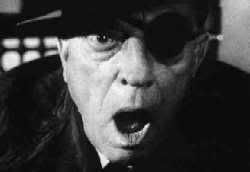1.01.2005
film
i've been seeing a lot of great movies lately, and at the top of my recent faves sits film, samuel beckett's 1965 near-silent collaboration with director alan schneider.
everything about film produces meaning. in fact, i would argue that there is more legitimate content (as opposed to narrative flourishes) in the twenty six minutes of this concise treasure than in most three hour epics. gestures, jokes, angles and actions are all multiple in a sense-- stretching laterally across horror, laughter and allegory. and, more or less, at its center sits an elderly buster keaton, here cast as a paranoid man who wishes not to be seen.
keaton's other-worldly presence resonates from the very start. though he hides his face for at least twenty minutes of screen time, one is keenly aware of his singular corporeal abilities. through his demonstrative lexicon of postures, a kind of woozy dance occurs upon the threshold of terror and laughter. beckett and schneider manage to pinpoint that threshold and hold it; they examine it through a variety of lenses and physical predicaments. keaton's fear of his own kittens, for example, is not a distraction from its otherwise foreboding airs, but rather an expression of the affective space that film inhabits. the kitties are cute, of course-- but "cute" is rendered uncanny.
in the end, one could say that film encourages some sort of allegorical meditation... is beckett poking fun at the nausea produced by our addiction to images? or does he have something more personal in mind... our inability to escape ourselves, etc.? both of these possibilities (especially when shrink-wrapped into blog-entry sound bytes) are insufficient explanations of film. and though perhaps its intention is to trigger a larger philosophical meditation (at least in some regard), there is much to say of the "earthly" side of film-- the structure and the schematics of it. the physical distress it produces while watching it-- and how that distress sort of tickles you somehow. i certainly haven't "cracked the code" of beckett's eventual meaning(s)-- though i suspect he has something less-than-rigid in mind. with or without a clear allegorical leaning, if your eyes and ears are sufficiently open, you will hear film's eerie laughter.

everything about film produces meaning. in fact, i would argue that there is more legitimate content (as opposed to narrative flourishes) in the twenty six minutes of this concise treasure than in most three hour epics. gestures, jokes, angles and actions are all multiple in a sense-- stretching laterally across horror, laughter and allegory. and, more or less, at its center sits an elderly buster keaton, here cast as a paranoid man who wishes not to be seen.
keaton's other-worldly presence resonates from the very start. though he hides his face for at least twenty minutes of screen time, one is keenly aware of his singular corporeal abilities. through his demonstrative lexicon of postures, a kind of woozy dance occurs upon the threshold of terror and laughter. beckett and schneider manage to pinpoint that threshold and hold it; they examine it through a variety of lenses and physical predicaments. keaton's fear of his own kittens, for example, is not a distraction from its otherwise foreboding airs, but rather an expression of the affective space that film inhabits. the kitties are cute, of course-- but "cute" is rendered uncanny.
in the end, one could say that film encourages some sort of allegorical meditation... is beckett poking fun at the nausea produced by our addiction to images? or does he have something more personal in mind... our inability to escape ourselves, etc.? both of these possibilities (especially when shrink-wrapped into blog-entry sound bytes) are insufficient explanations of film. and though perhaps its intention is to trigger a larger philosophical meditation (at least in some regard), there is much to say of the "earthly" side of film-- the structure and the schematics of it. the physical distress it produces while watching it-- and how that distress sort of tickles you somehow. i certainly haven't "cracked the code" of beckett's eventual meaning(s)-- though i suspect he has something less-than-rigid in mind. with or without a clear allegorical leaning, if your eyes and ears are sufficiently open, you will hear film's eerie laughter.

